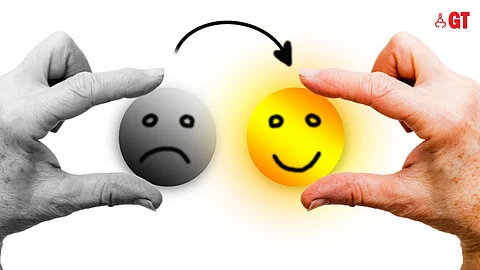

Different individuals have varying interpretations of happiness. For some, it is a mental state, while for others, it is derived from external factors, such as the world around them and their perceptions of it.
India is placed at a dismal 126th position among 143 countries in the World Happiness Report 2024, a climb down by one place from last year. This report, a worldwide happiness index, was published on March 20 to commemorate the United Nations' International Day of Happiness.
Unfortunately, India has been ranked lower than Pakistan, Libya, Iraq, Palestine and Niger in this report based on a study conducted by a collaboration of Gallup, the Oxford Wellbeing Research Centre, the UN Sustainable Development Solutions Network, and the WHR's Editorial Board, as reported in a section of the media.
India's position on the happiness chart is not surprising. It is a common occurrence when individuals and leaders start chasing unthinkable goals, they create a chasm between themselves and their goals. And when this chasm widens, unhappiness is the end result.
India is placed at a dismal 126th position among 143 countries in the World Happiness Report 2024.
What we see today in our country is that rising prices, religious intolerance, social injustice, environmental degradation and mental health problems have further distanced our worldly pursuits from us.
Since most of us have hinged our happiness to these goals, unhappiness kicks the door open. And the level of happiness of a country is directly linked to the overall welfare of its citizens, which is not consistent in this part of the world.
Suppose we consider the possibility that this happiness index report is inaccurate, and that we are actually a contented society. In that case, how would you assess your own level of happiness on a scale? Merely claiming to be happy does not automatically make it so. There are various factors that contribute to determining one's true happiness.
In Goa's Panjim city if you inquire about the happiness of any resident, they are likely to offer you a tour of the city to show you the constant dust pollution caused by the never-ending Smart City projects, which are poorly executed. So much so, they had to knock on the doors of the court to rid them of the ignominy.
Every street in Goa that is covered in festering garbage will only raise a stink and not the happiness index.
Every street in Goa that is covered in festering garbage will only raise a stink and not the happiness index. The presence of garbage, which represents unhappiness, on the streets is a clear indication of our selfishness, as it shows that we prioritise our own well-being over that of others.
If garbage is one factor that negatively impacts the well-being of its residents, Goa is burdened with numerous issues such as deforestation, pollution of rivers due to raw sewage, and large-scale commercial projects that are leading us to despair. Are we really happy with all these issues raising their ugly head every now and then?
We have the power to determine our own happiness or, more precisely, the pursuit of happiness. However, it is important to first identify the things that bring us joy.
It is time to reflect on the past and recognise what brought us happiness, as well as assess the present and acknowledge what we have lost that is causing us unhappiness.
In Goa, we are currently observing a decrease in the factors that previously brought us immense happiness. The air quality is gradually worsening, the hillsides are vanishing, the beaches are littered with garbage of all kinds, and the roads are becoming congested with traffic. These issues serve as an indicator of our current state of contentment, or rather, discontentment.
Remember, there is a difference between feeling good at a particular point in time and overall happiness. These are two different things. It is time for our governments to go beyond gross domestic product and now focus on gross people's happiness, if we are to become a country of happy people.